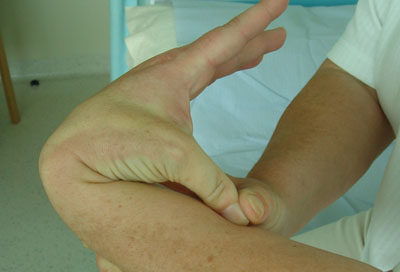Summary
Definition
History and exam
Key diagnostic factors
- presença de fatores de risco
- hipermobilidade articular
- dor na articulação ou na coluna
- atraso motor na primeira infância
- síndrome da dor crônica
- fadiga
- luxação ou subluxação da articulação recorrente
- dor muscular e/ou espasmo muscular
- pele de textura macia e sedosa
- pele semitransparente
- dobra dupla da pele elástica e fina
- cicatrizes atróficas
- hematomas frequentes
- estrias
- má cicatrização de feridas e/ou deiscência da ferida
- lesão significativa
- história de efeito tardio da anestesia local
Other diagnostic factors
- hipotonia muscular
- veias varicosas
- hérnia da parede abdominal, inguinal ou paraumbilical
- prolapso retal ou uterino
- hipotensão ortostática
- intolerância ortostática
- Síndrome de taquicardia postural ortostática
- hipotensão neuromediada
- hábito marfanoide
- manifestações gastrointestinais
- manifestações ginecológicas
- anomalias oculares
- clique no meio da sístole ou sopro sistólico tardio
Risk factors
- história familiar de hipermobilidade articular ou síndrome de Ehlers-Danlos
- mutações genéticas
Diagnostic tests
1st tests to order
- diagnóstico clínico
- teste genético
Tests to consider
- hemograma completo
- exames de coagulação
- teste da mesa inclinável
- radiografia da coluna
- ecocardiograma
- imagiologia e endoscopia digestivas
Treatment algorithm
todos os pacientes
Contributors
Authors
Shweta Dhar, MD, MS, FACMG, FACP
Professor
National Program Executive Director, Genomics
Veterans Affairs
Director, Adult Genetics Division
Department of Molecular & Human Genetics
Baylor College of Medicine
Chief, Section of Genetic Medicine
Michael E. Debakey Veterans Affairs Medical Center
Houston
TX
Disclosures
SD receives royalties from Elsevier for the Handbook of Adult Genetics & Genomics. SD is on the Board of Directors for the American College of Medical Genetics & Genomics (ACMG) and is course director for the ACMG 101 course for non-genetics providers.
Acknowledgements
Dr Shweta Dhar would like to gratefully acknowledge Dr Rodney Grahame and Dr Alan Hakim, the previous contributors to this monograph. RG and AH are authors of several references cited in this monograph.
Peer reviewers
Howard P. Levy, MD, PhD
Assistant Professor
Division of General Internal Medicine
Department of Medicine
McKusick-Nathans Institute of Genetic Medicine
Johns Hopkins University
Baltimore
MD
Disclosures
HPL is an author of a number of references cited in this monograph.
Bert Callewaert, MD
Research Assistant
Fund for Scientific Research
Flanders Centre for Medical Genetics
Ghent University Hospital
Ghent
Belgium
Declarações
BC declares that he has no competing interests.
Howard Bird, MA, MD, FRCP
Professor of Pharmacological Rheumatology
University of Leeds
Chapel Allerton Hospital
Leeds
UK
Declarações
HB declares that he has no competing interests.
Créditos aos pareceristas
Os tópicos do BMJ Best Practice são constantemente atualizados, seguindo os desenvolvimentos das evidências e das diretrizes. Os pareceristas aqui listados revisaram o conteúdo pelo menos uma vez durante a história do tópico.
Declarações
As afiliações e declarações dos pareceristas referem--se ao momento da revisão.
Referências
Principais artigos
Malfait F, Francomano C, Byers P, et al. The 2017 international classification of the Ehlers-Danlos syndromes. Am J Med Genet C Semin Med Genet. 2017 Mar;175(1):8-26.Texto completo Resumo
Hakim AJ, Sahota A. Joint hypermobility and skin elasticity: the hereditary disorders of connective tissue. Clin Dermatol. 2006 Nov-Dec;24(6):521-33. Resumo
Castori M. Ehlers-danlos syndrome, hypermobility type: an underdiagnosed hereditary connective tissue disorder with mucocutaneous, articular, and systemic manifestations. ISRN Dermatol. 2012;2012:751768.Texto completo Resumo
Artigos de referência
Uma lista completa das fontes referenciadas neste tópico está disponível para os usuários com acesso total ao BMJ Best Practice.

Diagnósticos diferenciais
- Síndrome de Marfan
- Fibromialgia
- Encefalomielite miálgica (síndrome da fadiga crônica)
Mais Diagnósticos diferenciaisDiretrizes
- Management of chronic pain in children
- The 2017 international classification of the Ehlers-Danlos syndromes
Mais DiretrizesFolhetos informativos para os pacientes
Fibromialgia: o que é?
Fibromialgia: quais são as opções de tratamento?
Mais Folhetos informativos para os pacientesVideos
Escore de Beighton
Mais vídeosConectar-se ou assinar para acessar todo o BMJ Best Practice
O uso deste conteúdo está sujeito ao nosso aviso legal